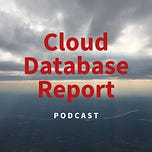In this episode of the Cloud Database Report Podcast, I talk with Karthik Ranganathan, co-founder and CTO of Yugabyte, about what makes Yugabyte’s distributed cloud database unique in a crowded and competitive market.
One differentiator is that Yugabyte’s open source database is compatible with PostgreSQL (a SQL database) and Apache Cassandra (a NoSQL database), making it possible for developers to build applications that take advantage of the respective features and characteristics of both.
Ranganathan discusses the design considerations that influenced development of YugabyteDB, including the learnings gleaned from the engineering team’s previous work at Facebook. YugabyteDB can be deployed on premises or as a cloud service. With built-in replication, YugabyteDB can be used to distribute data across geographic regions in support of data localization requirements and for high availability.
Key topics in the interview include:
The Yugabyte engineering team worked on the HBase and Cassandra databases at Facebook, experience that is now carrying over to the work they are doing at Yugabyte.
How YugabyteDB is different from other distributed SQL databases, including its support for both SQL and NoSQL interfaces.
Common uses cases for Yugabyte DB include real-time transactions, microservices, Edge and IoT applications, and geographically-distributed workloads.
Yugabyte is available via Apache 2.0 license and as self-managed and fully-managed cloud services.
Quotes from the podcast:
“One of the important characteristics of transactional data is the fact that it needs to live forever.”
“We reuse the upper half of Postgres, so it literally is Postgres-compatible and has all of the features.”
“We said we're going to meet developers where they develop. We will support both API's [SQL and NoSQL]. We're not going to invent a new API — that's what people hate.”
“It's not the database that people pay money for; it’s the operations of the database and making sure it runs in a turnkey manner that people really find valuable in an enterprise setting.”











